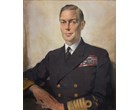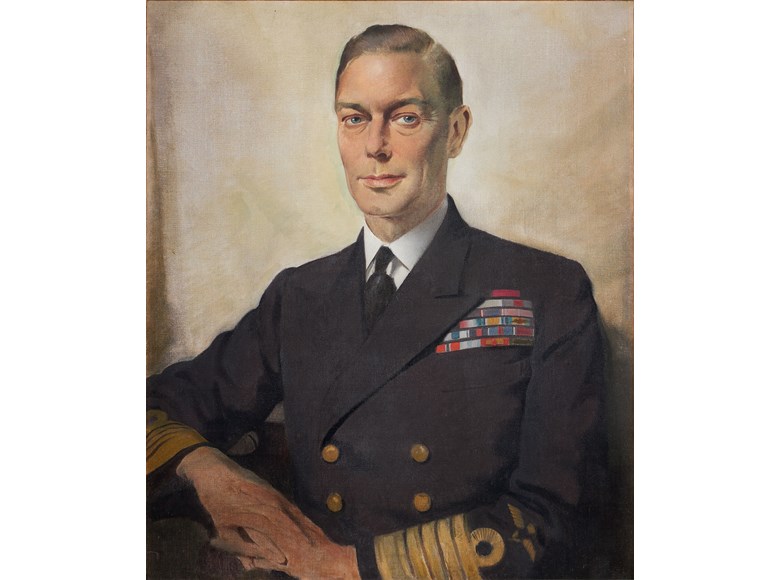 BACK TO GALLERY
BACK TO GALLERY
Rountree Tryon Galleries
Sir Herbert James Gunn
Portrait of H.M. King George VI
29 3/4 x 25 1/4 in. (75.5 x 64.2 cm)
description
Sir Herbert James Gunn, R.A. (1893-1964)
Portrait of H.M. King George VI
oil on canvas
29 3/4 x 25 1/4 in. (75.5 x 64.2 cm)
Provenance:
The estate of the artist;
The Fine Art Society, 1989;
Private collection, USA;
Christie's South Kensington, 20th June 2013, lot 118A.
This painting is a preparatory portrait for a final version, commissioned by the British Council as a gift for the Belgian Club, London. The final picture was exhibited at the Royal Academy in 1944 (Cat. No. 261). An article in The Tatler, May 10 1944, described the background to the work:
'Mr. James Gunn's excellent portrait of His Majesty, which shows the King in his favourite uniform as Admiral of the Fleet, is destined to hang in the Belgian Club in London, a gift from the British Council. It has a special distinction of its own, for the King, contrary to usual custom, did not give Mr. Gunn sittings at Buckingham Palace, but went instead to the artist's studio in Pembroke Walk several times, sometimes accompanied by the Queen, to sit for an hour between talks with Cabinet Ministers and other State business. It is possibly because of these visits that Mr. Gunn has been able to get such a human and expressive portrait of the King obviously every artist must feel freer to express himself in the familiar surroundings of his own studio than in the somewhat awe-inspiring and overwhelming dignity of Buckingham'.
In the present painting, Gunn captures a relaxed expression on the King, in contrast to the more serious and formal demeanor of the finished work. A wonderful likeness is achieved and it is intriguing to imagine the rapport between artist and sitter in the studio, as the King offers the hint of a smile. Gunn was clearly still experimenting with the position of the hands which remain unfinished and in the final work has opted for the left hand to clasp the right, rather than interlocking the fingers. There are other adjustments in the Royal Academy exhibit - the view is from a greater distance, allowing for the introduction of the right elbow and a chair. Instead of looking to his left, the King looks directly at the viewer from a further side-on position, adding to an overall more official portrayal. Thus, this early concept has an intimate and informal quality, providing insight into the journey of the commission.
Gunn’s portrait of the King was not the only work he exhibited at the Royal Academy in 1944. A glamourous and seductive portrait of his wife, Pauline in the Yellow Dress (no.244), caused a stir amongst the public and was hailed the ‘Mona Lisa of 1944’ by the Daily Mail. While it lifted spirits and represented hope for many, others considered it inappropriate in a time of austerity and rationing. Foreseeing the potential for divided opinion, Gunn also submitted his portrait of the King in naval uniform, to offer a more sobering symbol of patriotism and the war effort. Pauline was purchased by the Harris Museum and Art Gallery in Preston and remains the most celebrated work in their collection today.
Other notable portraits by Gunn include Queen Elizabeth II (Royal Collection, 1953), Harold Macmillan as Chancellor of Oxford University (Balliol College, Oxford, 1962) and a conversation piece of the Royal Family taking tea at the Royal Lodge in Windsor (commissioned by the National Portrait Gallery, 1950). Gunn was made a Royal Academician in 1961 before being Knighted for services to painting in 1963.
Portrait of H.M. King George VI
oil on canvas
29 3/4 x 25 1/4 in. (75.5 x 64.2 cm)
Provenance:
The estate of the artist;
The Fine Art Society, 1989;
Private collection, USA;
Christie's South Kensington, 20th June 2013, lot 118A.
This painting is a preparatory portrait for a final version, commissioned by the British Council as a gift for the Belgian Club, London. The final picture was exhibited at the Royal Academy in 1944 (Cat. No. 261). An article in The Tatler, May 10 1944, described the background to the work:
'Mr. James Gunn's excellent portrait of His Majesty, which shows the King in his favourite uniform as Admiral of the Fleet, is destined to hang in the Belgian Club in London, a gift from the British Council. It has a special distinction of its own, for the King, contrary to usual custom, did not give Mr. Gunn sittings at Buckingham Palace, but went instead to the artist's studio in Pembroke Walk several times, sometimes accompanied by the Queen, to sit for an hour between talks with Cabinet Ministers and other State business. It is possibly because of these visits that Mr. Gunn has been able to get such a human and expressive portrait of the King obviously every artist must feel freer to express himself in the familiar surroundings of his own studio than in the somewhat awe-inspiring and overwhelming dignity of Buckingham'.
In the present painting, Gunn captures a relaxed expression on the King, in contrast to the more serious and formal demeanor of the finished work. A wonderful likeness is achieved and it is intriguing to imagine the rapport between artist and sitter in the studio, as the King offers the hint of a smile. Gunn was clearly still experimenting with the position of the hands which remain unfinished and in the final work has opted for the left hand to clasp the right, rather than interlocking the fingers. There are other adjustments in the Royal Academy exhibit - the view is from a greater distance, allowing for the introduction of the right elbow and a chair. Instead of looking to his left, the King looks directly at the viewer from a further side-on position, adding to an overall more official portrayal. Thus, this early concept has an intimate and informal quality, providing insight into the journey of the commission.
Gunn’s portrait of the King was not the only work he exhibited at the Royal Academy in 1944. A glamourous and seductive portrait of his wife, Pauline in the Yellow Dress (no.244), caused a stir amongst the public and was hailed the ‘Mona Lisa of 1944’ by the Daily Mail. While it lifted spirits and represented hope for many, others considered it inappropriate in a time of austerity and rationing. Foreseeing the potential for divided opinion, Gunn also submitted his portrait of the King in naval uniform, to offer a more sobering symbol of patriotism and the war effort. Pauline was purchased by the Harris Museum and Art Gallery in Preston and remains the most celebrated work in their collection today.
Other notable portraits by Gunn include Queen Elizabeth II (Royal Collection, 1953), Harold Macmillan as Chancellor of Oxford University (Balliol College, Oxford, 1962) and a conversation piece of the Royal Family taking tea at the Royal Lodge in Windsor (commissioned by the National Portrait Gallery, 1950). Gunn was made a Royal Academician in 1961 before being Knighted for services to painting in 1963.






 SEND AN EMAIL
SEND AN EMAIL
 +441798344207
+441798344207